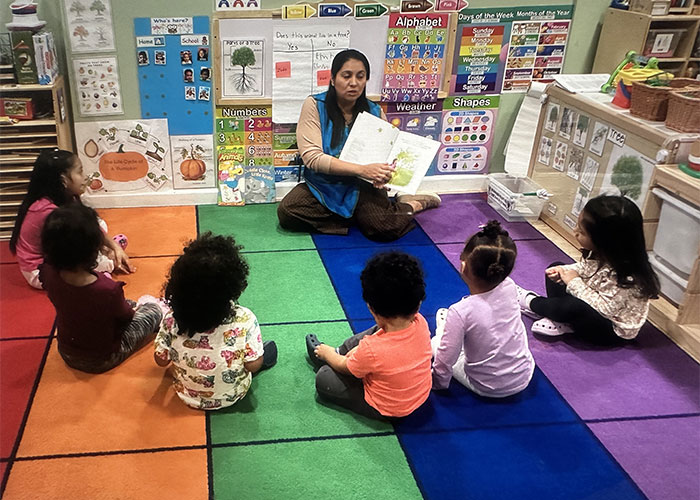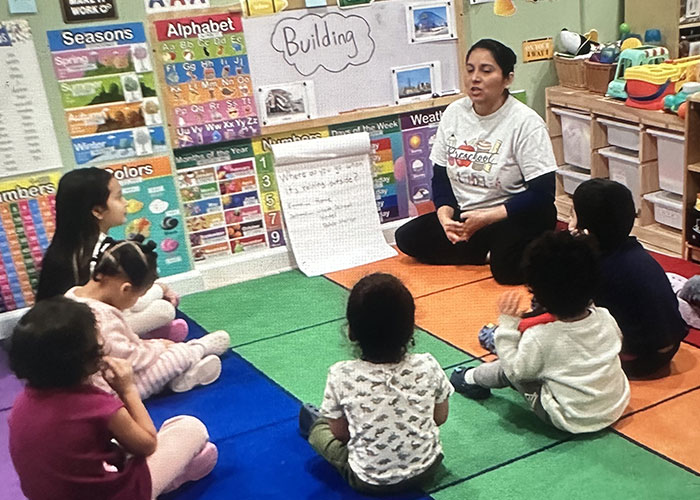
By Eboni Delaney, Assistant Director of Narrative and Movement Building
Across the country, family child care (FCC) educators quietly carry the emotional and structural weight of our early learning system. They are the steady hands in times of crisis, the first to greet children each morning, and often the only stable point in a family’s day. Their homes become sanctuaries—not just for care, but for hope. Yet behind the walls of these programs, a deeper reality unfolds—one that FCC educator Lindelia Ventura has bravely brought to light.
“Especialmente, deseo enfocar mi atención en los niños más pequeños, quienes no solo se ven afectados emocionalmente, sino que también enfrentan riesgos a futuro debido a los miedos y emociones que están desarrollando en su entorno. Las circunstancias que muchos de ellos están viviendo están moldeando su presente y, si no se abordan, podrían afectar negativamente su desarrollo futuro. Es crucial generar conciencia sobre estos problemas para proteger su bienestar y asegurar que puedan crecer en un ambiente saludable, libre de temores y preocupaciones que puedan limitarlos.”
“I especially want to focus my attention on the youngest children, who are not only emotionally affected but also face future risks due to the fears and emotions they are developing in their environment. The circumstances many of them are living through are shaping their present, and if left unaddressed, could negatively impact their future development. It is crucial to raise awareness about these issues to protect their well-being and ensure they can grow up in a healthy environment, free from fears and worries that may hold them back.”
Lindelia’s reflection cuts through policy language and academic framing to get to the heart of what’s at stake: the emotional lives of young children. These aren’t abstract concerns—they’re daily realities. Children internalize what they feel around them. When caregivers—whether parents or FCC educators—are overwhelmed, unsupported, or under stress, that energy ripples into the hearts of the very children they nurture. What starts as invisible stress can become lifelong barriers to learning, connection, and stability.
The child care sector is at a crossroads. Federal and state funding decisions will determine whether FCC educators receive the support they need to continue providing safe, nurturing environments for children. Without substantial investment, educators like Lindelia will face even greater challenges—and families will continue to struggle to find affordable, quality care.
Her insight comes at a moment when the field is confronting urgent questions about sustainability. Family child care educators, though essential, remain at the margins of funding and policy systems. Despite being the preferred choice for many families due to their flexibility, cultural familiarity, and relational closeness, FCC educators are often excluded from the infrastructure that supports center-based programs. According to the NAFCC 2024–2025 Annual Survey, more than half of FCC educators report earning less than $15 an hour. Seventy-three percent lack access to retirement or health benefits. An overwhelming 82% work more than 50 hours a week—often managing the financial strain of running a small business while also bearing the emotional weight of caregiving. These aren’t just statistics; they are warning signs of a system stretched too thin, threatening both educator well-being and the quality of care children receive.

Lindelia’s story also reflects the quiet fears many families experience. Some parents are afraid to speak up about their needs—not because they don’t care, but because they’re navigating insecurity and fear. They fear losing their spot in care. They fear instability. They fear that no one is truly listening. And that silence—born from survival—leaves many educators to carry even more.
Raising awareness is more than just naming these problems. It’s about demanding better. And that’s why stories like Lindelia’s matter. Through NAFCC’s ongoing advocacy, her voice—like so many others—is being lifted to help shift the narrative around family child care and create real change.
Her story connects to several NAFCC policy priorities, such as increased FCC educator and staff compensation and benefits so that providers aren’t forced to sacrifice their own well-being to sustain their programs. It also highlights the need for ensuring sustainable FCC businesses—so that educators can continue doing this critical work without being pushed to the brink. Equally vital is the call for strong ecosystem of support that recognizes the emotional toll of this work and provides meaningful resources to address it. And at the center of it all: children’s emotional and mental well-being, which must be protected not only through direct services, but by supporting the caregivers who hold them every day.
Lindelia reminds us that FCC educators are not just providers. They are lifelines. They are trauma-informed caregivers, early literacy guides, trusted community leaders, and fierce advocates for the children in their care. Their insight isn’t optional—it’s essential. When they speak, we must listen—not just with appreciation, but with action.
NAFCC is committed to ensuring these voices are heard and that policy change reflects the truth of what’s happening inside the homes and hearts of family child care educators. If you are an FCC educator, your voice matters. Your story can shift perspectives, influence legislation, and move us closer to a system that truly values the people caring for our youngest children.
To take action or share your story, visit https://nafcc.org/act-now/ or email us at storytelling@nafcc.org.
Because, as Lindelia has shown us, we cannot afford to stay silent. The future of family child care—and the well-being of our children—depends on it.
Lindelia Ventura, Family Child Care Educator – Maryland
As featured in the National Association for Family Child Care (NAFCC) blog, “In Their Own Words: Lindelia Ventura on the Hidden Toll of Crisis in Family Child Care” (2025).




